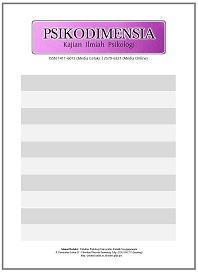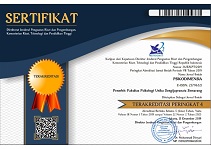Family-Supportive Supervisor Behavior dan Work Engagement Di Era Pandemi
Abstract
Era pandemi mengubah lingkungan kerja karyawan menjadi lebih banyak dilakukan di rumah, hal ini menimbulkan pertanyaan apakah terdapat perubahan work engagement karyawan. Work engagament merupakan faktor yang penting dalam organisasi. Interaksi lingkungan kerja mempengaruhi work engagement karyawan. Penelitian ini bertujuan untuk mengetahui bagaimana mekanisme hubungan tidak langsung family-supportive supervisor behavior, work-family enrichment, dan work engagement selama era pandemi yang dimoderasi work-family culture. Data diperoleh dari pegawai instansi pemerintah yang berlokasi di Jakarta dan menerapkan work from home ataupun sistem kerja hybrid, dengan masa kerja minimal satu tahun di bawah atasan yang sama. Pengambilan data dilakukan menggunakan convenience sampling, dengan N = 174 (64,9 persen perempuan, usia rata-rata 36,5 tahun). Dalam penelitian ini, analisis regresi dengan Hayes PROCESS model 14 digunakan sebagai metode analisis. Hasil studi mendukung adanya efek moderasi work-family culture pada hubungan tidak langsung family-supportive supervisor behavior pada work engagement melalui work-family enrichment. Untuk meningkatkan work engagement di era pandemi ini, organisasi dapat menerapkan program yang meningkatkan family-supportive supervisor behavior, mengurangi work-family enrichment, dan meningkatkan work-family culture.
Keywords
Full Text:
PDF (Bahasa Indonesia)References
Albdour, A. A., & Altarawneh, I. I. (2014). Employee engagement and organizational commitment: Evidence from Jordan. International Journal of Business, 19(2), 192–212.
Bagger, J., & Li, A. (2014). How Does Supervisory Family Support Influence Employees’ Attitudes and Behaviors? A Social Exchange Perspective. Journal of Management, 40(4), 1123–1150. https://doi.org/10.1177/0149206311413922
Bakker, A. B., Demerouti, E., & Ten Brummelhuis, L. L. (2012). Work engagement, performance, and active learning: The role of conscientiousness. Journal of Vocational Behavior, 80(2), 555–564. https://doi.org/10.1016/j.jvb.2011.08.008
Bakker, A. B., Demerouti, E., & Sanz-Vergel, A. I. (2014). Burnout and Work Engagement: The JDR Approach. Annual Review of Organizational Psychology and Organizational Behavior, 1, 389–411. https://doi.org/10.1146/annurev-orgpsych-031413-091235
Bansal, N., & Agarwal, U. A. (2020). Direct and indirect effects of work‒family enrichment: role of gender role ideology. International Journal of Productivity and Performance Management, 69(5), 873–894. https://doi.org/10.1108/IJPPM-10-2018-0370
Bedarkar, M., & Pandita, D. (2014). A Study on the Drivers of Employee Engagement Impacting Employee Performance. Procedia - Social and Behavioral Sciences, 133, 106–115. https://doi.org/10.1016/j.sbspro.2014.04.174
Boakye, K. G., Apenteng, B. A., Hanna, M. D., Kimsey, L., Mase, W. A., Opoku, S. T., Owens, C., & Peden, A. (2019). The impact of interpersonal support, supervisory support, and employee engagement on employee turnover intentions: Differences between financially distressed and highly financially distressed hospitals. Health Care Management Review, 46(2), 135–144. https://doi.org/10.1097/HMR.0000000000000251
Carlson, D. S., Kacmar, K. M., Wayne, J. H., & Grzywacz, J. G. (2006). Measuring the positive side of the work-family interface: Development and validation of a work-family enrichment scale. Journal of Vocational Behavior, 68(1), 131–164. https://doi.org/10.1016/j.jvb.2005.02.002
Chanana, N., & Sangeeta. (2020). Employee engagement practices during COVID-19 lockdown. Journal of Public Affairs, 21(4). https://doi.org/10.1002/pa.2508
Colina, S., Marrone, N., Ingram, M., & Sánchez, D. (2016). Translation Quality Assessment in Health Research: A Functionalist Alternative to Back-Translation. Evaluation and the Health Professions, 40(3), 267–293. https://doi.org/10.1177/0163278716648191
Cozby, P. C., & Bates, S. C. (2018). Methods in behavioral research (13th Edition). New York, NY: McGraw-Hill Education.
De Janasz, S., Behson, S. J., Jonsen, K., & Lankau, M. J. (2013). Dual sources of support for dual roles: how mentoring and work-family culture influence work-family conflict and job attitudes. International Journal of Human Resource Management, 24(7), 1435–1453. https://doi.org/10.1080/09585192.2012.709187
De Jong, M. G., Pieters, R., & Fox, J. P. (2010). Reducing social desirability bias through item randomized response: An application to measure underreported desires. Journal of Marketing Research, 47(1), 14–27. https://doi.org/10.1509/jmkr.47.1.14
De Klerk, M., Nel, J. A., Hill, C., & Koekemoer, E. (2013). The development of the MACE work-family enrichment instrument. SA Journal of Industrial Psychology, 39(2), 1–16. https://doi.org/10.4102/sajip.v39i2.1147
French, K. A., & Agars, M. D. (2018). Work–Family Culture in Low-Income Environments: Can We Generalize? Journal of Career Development, 45(1), 50–67. https://doi.org/10.1177/0894845316664178
Gallup, Inc. (2021). State of the global workplace 2021 report. Retrieved from Gallup.com: https://www.gallup.com/workplace/349484/state-of-the-global-workplace.aspx
Garg, N., Murphy, W., & Singh, P. (2021). Reverse mentoring, job crafting and work-outcomes: the mediating role of work engagement. Career Development International, 26(2), 290–308. https://doi.org/10.1108/CDI-09-2020-0233
Gibran, V. M., Suyasa, P. T., & Mangarondang, M. E. (2020, Dec 28). Kiat Menjaga Keterikatan Perusahaan dan Karyawan selama Pandemi. Retrieved from Kompas.com: https://money.kompas.com/read/2020/12/28/084100526/kiat-menjaga-keterikatan-perusahaan-dan-karyawan-selama-pandemi?page=all
Greenhaus, J. H., & Powell, G. N. (2006). When Work and Family Are Allies : A Theory of Work-Family Enrichment. The Academy of Management Review, 31(1), 72–92. https://doi.org/10.2307/20159186
Halbesleben, J. R. B., Neveu, J. P., Paustian-Underdahl, S. C., & Westman, M. (2014). Getting to the “COR”: Understanding the Role of Resources in Conservation of Resources Theory. Journal of Management, 40(5), 1334–1364. https://doi.org/10.1177/0149206314527130
Hammer, L. B., Johnson, R. C., Crain, T. L., Bodner, T., Kossek, E. E., Davis, K. D., Kelly, E. L., Buxton, O. M., Karuntzos, G., Chosewood, L. C., & Berkman, L. (2016). Intervention Effects on Safety Compliance and Citizenship Behaviors : Evidence From the Work, Family, and Health Study. Journal of Applied Psychology, 101(2), 190–208. https://dx.doi.org/10.1037/ap10000047
Hammer, L. B., Kossek, E. E., Yragui, N. L., Bodner, T. E., & Hanson, G. C. (2009). Development and validation of a multidimensional measure of family supportive supervisor behaviors (FSSB). Journal of Management, 35(4), 837–856. https://doi.org/10.1177/0149206308328510
Hammer, L. B., Kossek, E. E., Bodner, T., & Crain, T. (2013). Measurement development and validation of the family supportive supervisor behavior short-form (FSSB-SF). Journal of Occupational Health Psychology, 18(3), 285–296. https://doi.org/10.1037/a0032612
Hanaysha, J. (2016). Testing the Effects of Employee Engagement, Work Environment, and Organizational Learning on Organizational Commitment. Procedia - Social and Behavioral Sciences, 229, 289–297. https://doi.org/10.1016/j.sbspro.2016.07.139
Hayes, A. F. (2018). Introduction to Mediation, Moderation and Conditional Process Analysis: A Regression-Based Approach (2nd Edition). New York, NY: Guilford Press.
Hobfoll, S. E., Halbesleben, J., Neveu, J.P., & Westman, M. (2018). Conservation of resources in the organizational context: The reality of resources and their consequences. Annual Review of Organizational Psychology and Organizational Behavior, 5, 103–128. https://doi.org/10.1146/annurev-orgpsych-032117-104640
Huang, X. (2012). Helplessness of empowerment: The joint effect of participative leadership and controllability attributional style on empowerment and performance. Human Relations, 65(3), 313–334. https://doi.org/10.1177/0018726711429876
Koch, A. R., & Binnewies, C. (2015). Setting a good example: Supervisors as work-life-friendly role models within the context of boundary management. Journal of Occupational Health Psychology, 20(1), 82–92. https://doi.org/10.1037/a0037890
Koekemoer, E., Olckers, C., & Nel, C. (2020). Work–family enrichment, job satisfaction, and work engagement: The mediating role of subjective career success. Australian Journal of Psychology, 72(4), 347–358. https://doi.org/10.1111/ajpy.12290
Kuntari, C. M. I. S. R. (2020). Hubungan antara work-family enrichment dengan work engagement pada perawat wanita. Jurnal Psikologi Ulayat, 2(1), 407–417. https://doi.org/10.24854/jpu32
Matos, K., O’Neill, O.M., & Lei, X. (2018). Toxic Leadership and the Masculinity Contest Culture: How “Win or Die” Cultures Breed Abusive Leadership. Journal of Social Issues, 74(3), 500–528. https://doi.org/10.1111/josi.12284
Matsumoto, D., & Juang, L. (2013). Culture and psychology (5th edition). Belmont, CA: Wadsworth.
Matsuo, M. (2019). Effect of learning goal orientation on work engagement through job crafting: A moderated mediation approach. Personnel Review, 48(1), 220–233. https://doi.org/10.1108/PR-11-2017-0346
Matthews, R. A., Mills, M. J., Trout, R. C., & English, L. (2014). Family-supportive supervisor behaviors, work engagement, and subjective well-being: A contextually dependent mediated process. Journal of Occupational Health Psychology, 19(2), 168–181. https://doi.org/10.1037/a0036012
McKersie, S. J., Matthews, R. A., Smith, C. E., Barratt, C. L., & Hill, R. T. (2019). A process model linking family-supportive supervision to employee creativity. Journal of Occupational and Organizational Psychology, 92(4), 707–735. https://doi.org/10.1111/joop.12276
Nicklin, J. M., & McNall, L. A. (2013). Work-family enrichment, support, and satisfaction: A test of mediation. European Journal of Work and Organizational Psychology, 22(1), 67–77. https://doi.org/10.1080/1359432X.2011.616652
Odle-Dusseau, H. N., Britt, T. W., & Greene-Shortridge, T. M. (2013). Organizational work-family resources as predictors of job performance and attitudes: The process of work-family conflict and enrichment. Journal of Occupational Health Psychology, 17(1), 28–40. https://doi.org/10.1037/a0026428
Parent, J. D., & Lovelace, K. J. (2018). Employee engagement, positive organizational culture and individual adaptability. On the Horizon, 26(3), 206–214. https://doi.org/10.1108/OTH-01-2018-0003
Perrigino, M. B., Dunford, B. B., Troup, M., Boss, R. W., & Boss, D. S. (2019). Work-family culture within hospitals: An interdepartmental analysis of employee engagement and retention. Health Care Management Review, 44(4), 296–305. https://doi.org/10.1097/HMR.0000000000000190
Petrou, P., Demerouti, E., Peeters, M.C.W., Schaufeli, W.B., & Hetland, J. (2012). Crafting a job on a daily basis: Contextual correlates and the link to work enggament. Journal of Organizational Behavior, 33, 1120-1141. DOI: 10.1002/job.1783
Podsakoff, P. M., MacKenzie, S. B., Lee, J. Y., & Podsakoff, N. P. (2003). Common Method Biases in Behavioral Research: A Critical Review of the Literature and Recommended Remedies. Journal of Applied Psychology, 88(5), 879–903. https://doi.org/10.1037/0021-9010.88.5.879
Qing, G., & Zhou, E. (2017). Bidirectional work–family enrichment mediates the relationship between family-supportive supervisor behaviors and work engagement. Social Behavior and Personality, 45(2), 299–308. https://doi.org/10.2224/sbp.6023
Rofcanin, Y., Heras, M. Las, & Bakker, A. B. (2017). Family supportive supervisor behaviors and organizational culture: Effects on work engagement and performance. Journal of Occupational Health Psychology, 22(2), 207–217. https://doi.org/10.1037/ocp0000036
Russo, M., Buonocore, F., Carmeli, A., & Guo, L. (2015). When Family Supportive Supervisors Meet Employees’ Need for Caring: Implications for Work–Family Enrichment and Thriving. Journal of Management, 44(4), 1678–1702. https://doi.org/10.1177/0149206315618013
Schaufeli, W. B., Salanova, M., Gonzales-Roma, V., & Bakker, A. B. (2002). The measurement of engagement and burnout: A two sample confirmatory factor analytic approach. Journal of Happiness Studies, 3, 71–92. https://doi.org/10.1103/PhysRevE.63.021114
Shi, Y., Xie, J., Zhou, Z. E., Tang, H., & Ma, H. (2019). Family supportive supervisor behaviors and work engagement: A social information processing perspective. Current Psychology, 2. https://doi.org/10.1007/s12144-019-00574-6
Sok, J., Blomme, R., & Tromp, D. (2014). Positive and Negative Spillover from Work to Home: The Role of Organizational Culture and Supportive Arrangements. British Journal of Management, 25(3), 456–472. https://doi.org/10.1111/1467-8551.12058
Sonnentag, S., Eck, K., Fritz, C., & Kühnel, J. (2020). Morning Reattachment to Work and Work Engagement During the Day: A Look at Day-Level Mediators. Journal of Management, 46(8), 1408–1435. https://doi.org/10.1177/0149206319829823
Straub, C. (2012). Antecedents and organizational consequences of family supportive supervisor behavior: A multilevel conceptual framework for research. Human Resource Management Review, 22(1), 15–26. https://doi.org/10.1016/j.hrmr.2011.08.001
Strom, D. L., Sears, K. L., & Kelly, K. M. (2014). Work Engagement: The Roles of Organizational Justice and Leadership Style in Predicting Engagement Among Employees. Journal of Leadership and Organizational Studies, 21(1), 71–82. https://doi.org/10.1177/1548051813485437
Thompson, C. A., Beauvais, L. L., & Lyness, K. S. (1999). When Work-Family Benefits Are Not Enough: The Influence of Work-Family Culture on Benefit Utilization, Organizational Attachment, and Work-Family Conflict. Journal of Vocational Behavior, 54(3), 392–415. https://doi.org/10.1006/jvbe.1998.1681
Tims, M., Bakker, A. B., & Derks, D. (2012). Development and validation of the job crafting scale. Journal of Vocational Behavior, 80(1), 173–186. https://doi.org/10.1016/j.jvb.2011.05.009
Tims, M., Bakker, A. B., Derks, D., & van Rhenen, W. (2013). Job Crafting at the Team and Individual Level: Implications for Work Engagement and Performance. Group & Organization Management, 38(4), 427–454. https://doi.org/10.1177/1059601113492421
Wood, J., Oh, J., Park, J., & Kim, W. (2020). The Relationship Between Work Engagement and Work–Life Balance in Organizations: A Review of the Empirical Research. Human Resource Development Review, 19(3), 240–262. https://doi.org/10.1177/1534484320917560
Yan, X., Su, J., Wen, Z., & Luo, Z. (2017). The Role of Work Engagement on the Relationship Between Personality and Job Satisfaction in Chinese Nurses. Current Psychology, 38(3), 873–878. https://doi.org/10.1007/s12144-017-9667-8
DOI: https://doi.org/10.24167/psidim.v21i2.4858
Print ISSN : 1411-6073 | online ISSN : 2579-6321 View My Stats

This work is licensed under a Creative Commons Attribution 4.0 International License.




















